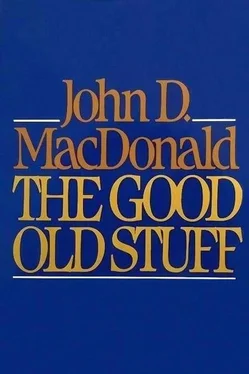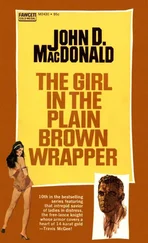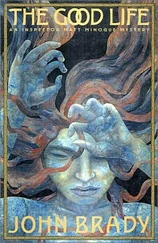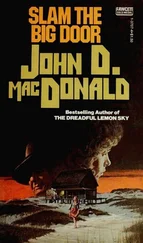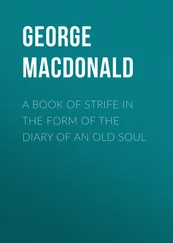The wind diluted the flat, smashing noise of the shot. As she hurried toward him, something drove her ahead as though she had been hit with a club. Falling, she half turned, landed heavily on a pile of jagged copper scrap, rebounded, lay still on the damp packed earth of the yard. The wind took the papers from her hand and whipped them away.
Jud Brock stood stupidly, unable to move. He looked at the office building seventy feet away. A window was flung up and one of the male clerks looked out, openmouthed. Jud ran to her. Her cheek was against the earth, and a dark red stain spread in the fabric of the gray coat. Her eyes were open, and there was an odd frown of surprise on her face. The saliva ran from her half-open mouth and her trim left leg twitched, in that muscular spasm that happens sometimes as sleep comes.
He ripped his canvas work glove off, dug blunt fingers into her wrist, and felt the weak fluttering. A girl ran from the side door of the office, paused, and looked uncertainly toward him as he knelt beside Stella.
“Ambulance! Doctor!” he yelled, his voice oddly shrill in his ears. The girl turned and darted back into the office.
Jud took the coat gently from her shoulders, took his knife out with fumbling haste, and slit the white blouse from the nape of her neck to the waist. He tore it across the shoulders and peeled it tenderly away from her white back. Her right shoulder was oddly misshapen, the thick blood oozing freely from a large-caliber hole in the bluish-white skin. He wadded a piece of the white blouse, jammed it against the hole in her back, and held it there with the palm of his left hand, the fingers of his right hand seeking the faint, irregular pulse, his ears straining for the distant sound of a siren...
When the ambulance backed into the yard, he could still feel the pulse, but it was much weaker. The numb eyes had rolled so that only the whites were visible, and her face had a greenish-blue pallor.
They taped a wad of gauze against the hole in her back, lifted her gently onto the stretcher, and slid her into the back of the ambulance. He noticed with annoyance that a lock of her hair had fallen across her face and knew that she wouldn’t like that and felt an absurd desire to run to her, to smooth her hair back with his fingers.
As the ambulance drove away he suddenly became conscious of the babble of voices, of questions, saw that almost the entire working force was gathered around him, the women hugging themselves against the chill wind, the eyes of the men bright and excited. He noticed that even the heavy thudding of the big baler had stopped, noticed that Karkoff, the operator, was standing with the others.
Walter Brasher, owner and manager of the Brasher Scrap Metal Company, Incorporated, was prancing through the group, saying, “Come on, now. It’s all over. Back to work. Come on, now. All of you.” Brasher was a stocky little man with a shining bald head and a pitted face on which the features were gathered in a muddy little clump.
He continually roared and made fierce noises, but every employee knew that inside he was soft and weak and had never fired an employee. He always asked someone else to break the bad news.
Karkoff spat, turned, and walked back toward the shop, back toward the baler which took the loose jangling heaps of scrap and turned them into small, neat, heavy bales. The girls turned and, walking with short steps, their shoulders hunched from the cold, hurried back to the warmth of the office.
Walter Brasher scowled up into Jud Brock’s face. “What happened to her?” he demanded. “What happened to Miss Galloway?”
“She was shot in the back with maybe a forty-five. Something heavy. She was coming out with orders for me.”
Brasher turned pale under the mud color of his skin. “Why? Why should somebody shoot one of my girls?”
Jud looked down at the man with quick irritation. “How the hell should I know? The cops are probably on the way.”
“You get back to work.”
Jud saw the gray coat, half on the ground, half on the pile of copper scrap. He bent and picked it up, looked at the small hole in the fabric. He held the coat and said to Brasher, “No, I don’t want to work. After the cops talk to me, I’m going to the hospital.”
Brasher frowned, turned on his heel, and walked with an attempt at dignity back toward the office. Jud followed him slowly, fancying that in the coat he held in his hand he could still detect the faint warmth of her body.
He hurried and caught Brasher at the door. He said, “Make sure that no one has left since it happened. Don’t let anybody leave.”
Brasher didn’t answer. Jud climbed the stairs to the main office, walked across to a group of girls who stood by the window, looking down at the yard where Stella had fallen. Jane Tarrance, a vivid dark girl with a wide, mobile mouth, Stella’s roommate, turned quickly and said, “She was shot, wasn’t she?”
“Yes,” he said, heavily, hearing the others gasp. He held the coat out. Jane took it quickly, her mouth twisted as she saw the bloodstain. She folded it, folded the stain inside.
At that moment Boris Howe, the accountant, a slow man with a wrestler’s body and the lean, myopic face of an introvert, walked over to him and said, “Uh... Brock, Mr. Brasher said for me to tell you that after the cops are through, you draw your pay and get out.”
Jud ignored him. He turned and looked toward Brasher’s glassed-in office, saw the gleaming top of Brasher’s bald head. He brushed by Howe, walked to the door of the office, opened it, and stood in front of Brasher’s desk until the man glanced up.
Brasher scowled, but his voice quavered as he said, “Well?”
Brock sat down, pulled out a cigarette, and lit it. “I got your message, Brasher.”
The voice was shrill. “To you I am Mr. Brasher!”
“You knew when you hired me that I had been a cop.”
“Certainly I knew it. And I knew that you had the shakes so bad that you could only work a little.”
“I’m over that now. I’ve gotten all I need out of this place. I’m ready to quit.”
“I fired you, Brock,” the plump little man said with surprising firmness.
“No, you did not. You’re about to change your mind. I’m staying on here until I find out why that girl was shot and who did it.”
“That is police business. You’re through here. You refused a direct order.”
“She’s my friend. It’s my business too. I want to stay on the payroll at a dollar a week until I find out why she was shot. I want the run of the place, and I want all employees told that I can ask any questions I wish to ask. You can call me the company cop if you want, but I’m staying.”
“You’re not staying.”
Brock reached quickly across the desk and grabbed Brasher’s wrist. His wrists and arms were like iron from the eight months of handling scrap. He clamped down on the wrist, and Brasher squealed. “Maybe you don’t understand me, Mr. Brasher,” Brock said heavily. “Unless you change your mind, I will find a chance to catch you on the street. When I do, I promise you that I will break both your fat arms like sticks.”
He released Brasher’s arm suddenly. With the pressure gone, Brasher’s chair rolled a few feet away from his desk.
Brock said softly, “And when I find out, I’ll leave here.”
Brasher smiled with his lips alone, said heartily, “I didn’t know you felt so strongly about it, Brock. I... I’ll be glad to have your help.”
Brock looked woodenly at him for several seconds, turned, and left the office. He stopped just outside the door as he saw Detective Lieutenant John Maclaren and Sergeant Joe Horowitz reach the top of the front stairs and look curiously around the office. John Maclaren saw Brock first, nudged Horowitz, and said something in a low tone. They both came toward him, grinning unpleasantly.
Читать дальше
